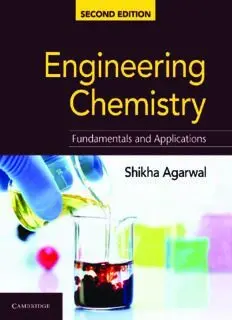Table Of ContentEngineering Chemistry
Engineering chemistry discusses fundamental theoretical concepts of chemistry and links them with their
engineering applications. First and second semester engineering students in various technical universities
study the subject, and this textbook has been designed to meet their course requirements in a comprehensive
manner. It supplements its treatment of the fundamental concepts and their applications by scores of
illustrations and learning exercises. Lucid language and an easy-to-learn approach will enable the readers to
assimilate the basic concepts and also facilitate comprehension by students not so strong in English language
skills. This revised, second, edition builds on the success and popularity of the first 2015 edition, which was
adopted as a text/reference book by several universities.
In addition to the topics in the first edition, this edition deals with new topics such as a detailed discussion
of renewable energy sources, nuclear fuels, defluoridation of water by Nalgonda technique and domestic
waste water management, periodic properties including classification of elements, periodicity in properties
and types of elements on the basis of their electronic configuration, periodic trends in properties like atomic
and ionic radii, ionisation enthalpy, electron gain enthalpy, electronegativity, Fajan’s rule and oxidation states
of elements of various groups, different theories of acids and bases like the Arrhenius theory, Bronsted–Lowry
concept, solvent system definition of acids and bases, Lewis concept, hard–soft acids and bases, oxidation and
reduction with its applications to the extraction of metals, Ellingham diagram, molecular interactions, real
gases and critical phenomenon, topics on quantum chemistry such as Schrodinger wave equation, particle in a
one- and three-dimensional box, Schrodinger wave equation for hydrogen and hydrogen-like system, Huckel
molecular orbital theory for conjugated system, semiconductors, superconductors and magnetic materials,
potential energy of surfaces, trajectories on potential energy surfaces, thermodynamic formulation of the
transition state theory, topics related to molecular spectroscopy like the Franck–Condon principle, rotational
(microwave) spectroscopy of diatomic molecules, vibrational rotational spectra of diatomic molecules,
Raman spectroscopy and applications of NMR spectroscopy in magnetic resonance imaging, drugs, absolute
configuration of organic compounds, coordination chemistry, nomenclature of coordination compounds,
bonding and isomerism in coordination compounds. The chapter on basics of environment science has been
removed in this edition.
Shikha Agarwal is an Assistant Professor in the Department of Chemistry, Government Engineering College,
Ajmer, India. She has more than two decades’ experience teaching engineering chemistry, environment
science, spectroscopy, photo-chemistry and reaction mechanism to undergraduate and graduate students.
Her areas of interest include organic chemistry, inorganic chemistry, and environment science.
Engineering Chemistry
Fundamentals and Applications
Second Edition
Shikha Agarwal
University Printing House, Cambridge CB2 8BS, United Kingdom
One Liberty Plaza, 20th Floor, New York, NY 10006, USA
477 Williamstown Road, Port Melbourne, vic 3207, Australia
314 to 321, 3rd Floor, Plot No.3, Splendor Forum, Jasola District Centre, New Delhi 110025, India
79 Anson Road, #06–04/06, Singapore 079906
Cambridge University Press is part of the University of Cambridge.
It furthers the University’s mission by disseminating knowledge in the pursuit of
education, learning and research at the highest international levels of excellence.
www.cambridge.org
Information on this title: www.cambridge.org/9781108724449
© Cambridge University Press 2015
This publication is in copyright. Subject to statutory exception
and to the provisions of relevant collective licensing agreements,
no reproduction of any part may take place without the written
permission of Cambridge University Press.
First published 2015
Second edition 2019
Printed in India
A catalogue record for this publication is available from the British Library
ISBN 978-1-108-72444-9 Paperback
Cambridge University Press has no responsibility for the persistence or accuracy
of URLs for external or third-party internet websites referred to in this publication,
and does not guarantee that any content on such websites is, or will remain,
accurate or appropriate.
To
His Holiness Shri Shivkripanand Swami
Contents
Preface to Second Edition xix
Preface to First Edition xxi
Acknowledgements xxv
1. Fuels 1
1.1 Introduction 1
1.2 Classification of Fuels 1
1.3 Characteristics of a Good Fuel 2
1.4 Calorific Value 4
1.5 Determination of Calorific Value 6
1.6 Solid Fuels 16
1.7 Analysis of Coal 17
1.8 Carbonisation of Coal 29
1.9 Liquid Fuels 35
1.10 Refining of Petroleum 36
1.11 Cracking 38
1.12 Synthetic Petrol 41
1.13 Knocking 45
1.14 Octane Rating 47
1.15 Diesel Engine Fuels 48
1.16 Knocking in Diesel Engine 48
1.17 Cetane Rating/Cetane Number 49
1.18 Reforming 49
1.19 Non Petroleum Fuels, Power Alcohol and Aviation Fuel 51
1.20 Gaseous Fuels 53
1.21 Natural Gas 53
1.22 Compressed Natural Gas (CNG) 54
1.23 Liquified Petroleum Gas 54
viii Contents
1.24 Coal Gas 55
1.25 Oil Gas 56
1.26 Producer Gas 57
1.27 Water Gas 59
1.28 Analysis of Flue Gas 60
1.29 Combustion Calculations 62
1.30 Renewable Sources of Energy 75
1.31 Nuclear Fuels 87
Summary 94
Review Questions 96
Multiple Choice Questions 98
2. Water 103
2.1 Introduction 103
2.2 Sources of Water 104
2.3 Effect of Water on Rocks and Minerals 105
2.4 Common Impurities of Water 106
2.5 Water Quality Standards 108
2.6 Hardness of Water 111
2.7 Disadvantages of Hard Water 119
2.8 Water for Industries 120
2.9 Boiler Problems with Hard Water 122
2.10 Softening Methods: External Treatment Process 130
2.11 Municipal Water Supply 156
2.12 Desalination of Water 163
2.13 Defluoridation 167
2.14 Waste Water Management 169
2.15 Chemical Analysis of Water 173
Summary 203
Review Questions 205
Multiple Choice Questions 206
3. Corrosion 209
3.1 Introduction 209
3.2 Effects of Corrosion 209
3.3 Theories/Mechanism of Corrosion 210
3.4 Types of Corrosion 217
3.5 Passivity 224
3.6 Galvanic Series 225

